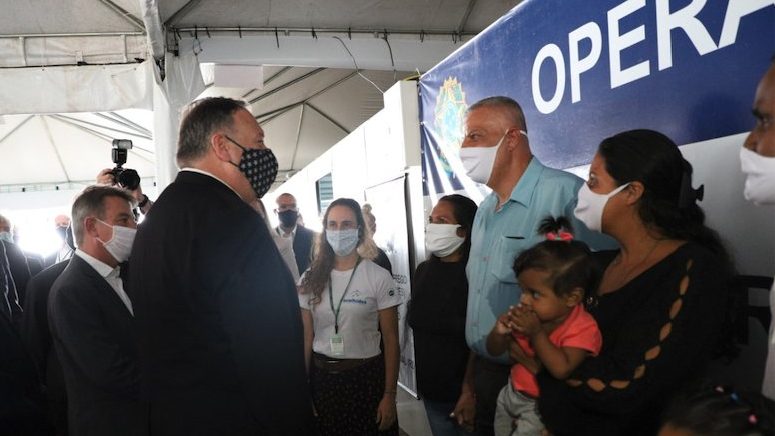Fleeing Venezuela's economic and political crises for Brazil 10 months ago, Gerardo Anatrella and his family were stuck on the streets of the town of Boa Vista for days until they finally were admitted to an immigrant shelter.
Operated by AVSI, a humanitarian aid and development agency with Catholic Church links, and the U.N. High Commissioner for Refugees, the shelter has welcomed hundreds of Venezuelans since July 2018.
The family's journey to Brazil is similar to that of thousands of refugees facing difficulty at home and acceptance in a new land. It has taken time for the family to adjust to their surroundings. Only recently have some members found work.
Their job: working at a slaughterhouse in Santa Catarina state far to the south. They will be leaving Boa Vista by the end of September.
Anatrella shared his story with U.S. Secretary of State Mike Pompeo Sept. 18 during the American official's visit to see the work of humanitarian church-connected agencies supported by the U.S. Agency for International Development.
"I (was) delighted my family has been chosen to meet Mike Pompeo. I think our story can serve as an example for so many families looking for a new opportunity in Brazil," Anatrella said.
Pompeo visited sites aiding the Venezuelans in northern-most Roraima state, where many refugees have landed. His first stop was in the border town of Pacaraima, with the second coming in Boa Vista.
Since 2015, more than 260,000 Venezuelans have crossed the border into Brazil, fleeing years of tumult and economic uncertainty.
Pompeo told reporters after the site visits that the U.S. supports the refugees who are seeking a better life.
"(Brazil has) provided shelter to nearly 265,000 Venezuelans who are deeply in need. Thank you for that. I met with some of these individuals. We spoke to a handful of them. They want what all human beings want: dignity. They want a democratic, peaceful, sovereign Venezuela to call home, one where they and their children could find jobs and live with that dignity," Pompeo said.
Diana Kraiser, project officer with AVSI Brazil, said Pompeo met for more than 10 minutes with the Anatrella family, asking them about their life in Venezuela and their journey to Brazil.
"Pompeo listened more than he spoke," Kraiser told Catholic News Service. "He was interested in what the family had to say, what kind of life they had in Venezuela before coming here."
After visiting the immigrant center, Pompeo traveled to Our Lady of Cosolata Parish in Boa Vista, where Caritas Brazil runs a water, sanitation and hygiene project funded by the U.S. Agency for International Development.
"There are three WASH projects here in Roraima, two in Boa Vista and one in Pacaraima," Wellthon Leal of Caritas Brazil said. "All three have been placed in Catholic churches or parishes."
The WASH project consisted of 16 bathroom facilities, 14 showers and several industrial washing machines.
Pompeo said the U.S. government has provided about $50 million in humanitarian aid to agencies in Roraima to assist the Venezuelans.
"Since the projects were implemented in October (2019), we've had over 4,000 people use the facilities and 27,000 accesses to the services," Leal said.
The facilities were a key factor in reducing the number of cases of COVID-19, the illness caused by the coronavirus, among immigrants living on the streets, he said.
Leal noted that since the border was closed in March, few Venezuelans have been able to cross into Brazil. "There are many waiting at the border to cross and there is concern of the great volume that may come to Boa Vista after borders open," he said.

